
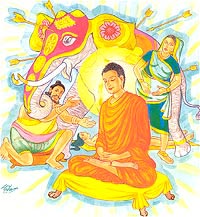
Verse 320. The Buddha's Endurance
Many folks are ill-behaved
but I shall endure abuse
as elephant in battle
arrows shot from a bow.
Explanation: I will endure the words of the unvirtuous, who make statements that go beyond the limits of decency. This is just as the elephant that endures arrows in battle.
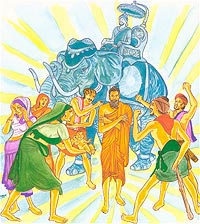
Verse 321. The Disciplined Animal
The tusker tamed they lead in crowds,
the king he mounts the tamed,
noblest of humans are the tamed
who can endure abuse.
Explanation: It is the disciplined animal (elephant or horse) that is led to a gathering. The king mounts a disciplined horse. Among men the disciplined one is the greatest. He has endured the harsh words of the people.
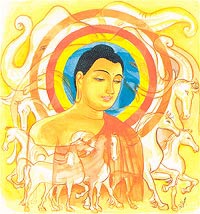
Verse 322. The Most Disciplined Animal
Excellent are mules when tamed
and thoroughbred from Sindh,
noble the elephant of state,
better still one tamed of self.
Explanation: When well trained, mules are useful. Sindu thoroughbreds are outstanding among horses. Of great elephants those of the Kunjara breed are the greatest. But, of all, the best is the person who has trained himself.
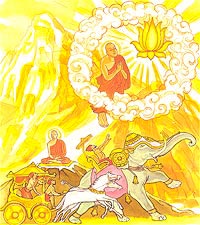
Verse 323. The Right Vehicle To Nibbana
Surely not on mounts like these
one goes the Unfrequented Way
as one by self well-tamed
is tamed and by the taming goes.
Explanation: Indeed, not be any means of transport can one go to the place one has never been before, but by thoroughly taming oneself, the tamed one can get to that place – Nibbana.
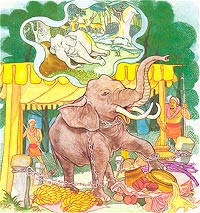
Verse 324. The Bound Elephant
Hard to check the tusker Dhanapala,
in rut with temple running pungently,
bound, e’en a morsel he’ll not eat
for he recalls the elephant-forest longingly.
Explanation: The elephant, Dhanapala, deep in rut and uncontrollable did not eat a morsel as he yearned for his native forest and pined for his parents.
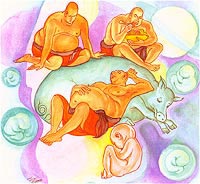
Verse 325. The Slothful, Greedy Sleeper Returns to Samsara, Over and Over
A sluggard stupid, steeped in gluttony,
who’s sleep-engrossed, who wallows as he lies,
like a great porker stuffed, engorged with swill,
comes ever and again into a womb.
Explanation: The stupid one who is lazy, gluttonous, and drowsy, who just wallows like a well-fed pig, is subjected to repeated births.
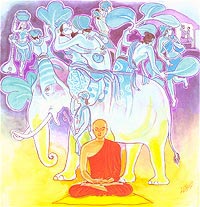
Verse 326. Restrain Mind As A Mahout An Elephant In Rut
Formerly this wandering mind wandered
where it wished, where whim, where pleasure led.
Wisely this day I will restrain it
as trainer with hook an elephant in rut.
Explanation: In Buddhist literature the image of the elephant being restrained is used as a parallel to the act of the spiritually advanced person restraining himself.
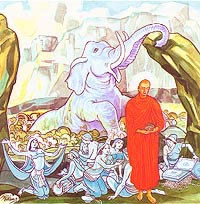
Verse 327. The Elephant Mired
Do you delight in heedfulness
and guard your own mind well!
Draw yourselves from the evil way
as would elephant sunk in slough.
Explanation: Take delight in mindfulness, guard your mind well. As an elephant stuck in mire pulls itself out, so also pull yourself out of the mire of moral defilements.
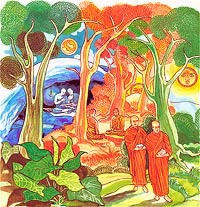
Verse 328. Cherish The Company Of The Good
If for practice one finds a friend
prudent, well-behaved and wise,
mindful, joyful, live with him
all troubles overcoming.
Explanation: If you come upon a mature wise companion whose ways are virtuous, you must associate with him as you can lead a happy and alert life, overcoming all dangers.
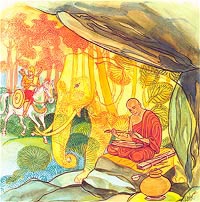
Verse 329. The Lonely Recluse
If for practice one finds no friend
prudent, well-behaved and wise,
like king be leaving conquered land,
fare as lone elephant in the wilds.
Explanation: If you cannot find a wise, mature companion whose ways are virtuous, you must go about life all alone like a king who, abandoning his conquered kingdoms, lives in exile, or like the elephant Matanga who roams the forest living in solitude.
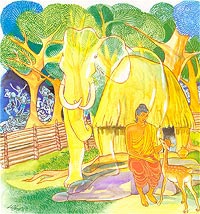
Verse 330. For The Solitary The Needs Are Few
Better it is to live alone
for with a fool’s no fellowship,
no evil do, be free of care,
fare as lone elephant in the wilds.
Explanation: Leading a solitary life is more commendable. One cannot keep company with ignorant ones. With only a limited number of needs, let one lead a life of solitude, doing no wrong, like the elephant Matanga.

Verse 331. The Blessed
Blest to have friends when one’s in need,
blest contentment with whatever is,
blessed is merit when life’s at an end,
abandoning all dukkha is blessedness.
Explanation: Friends in need are a comfort. Satisfaction with whatever little you have is a comfort. Merit, at the end of one’s days, is a comfort. It is a blessing, indeed, to eradicate all suffering.

Verse 332. Blessing To Be An Arahat
Respect for one’s mother brings happiness here
as well as respect for one’s father.
Here happiness comes from respecting the monks
and those of virtue excellent.
Explanation: In this world, motherhood is a blessing. In the same way, fatherhood, too, is a blessing. Monkhood is a blessing. Above all, arahathood is a blessing.
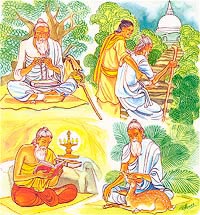
Verse 333. Four Forms Of Blessing
Bless is virtue till life’s end
and blest the faith standing firm,
blest the attainment of wisdom
and blest the non-doing of evils.
Explanation: Pursuit of virtue until old age and decay is a blessing. The acquisition of wisdom is a blessing, It is a blessing to refrain from unwholesomeness.

